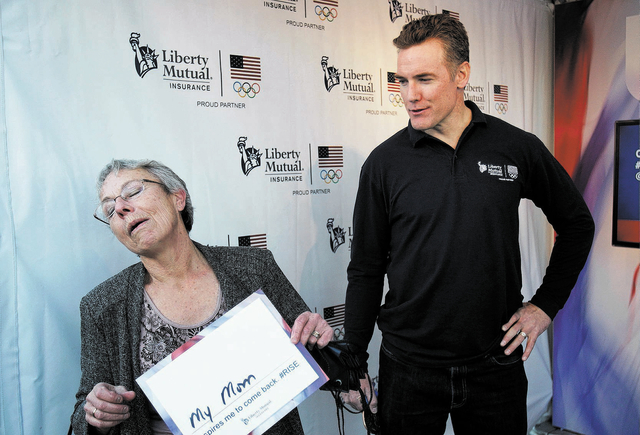Transplant didn’t stop Olympic snowboarder

Shaun White, the two-time Olympic gold medalist snowboarder known as “The Flying Tomato,” will be the most recognizable U.S. Olympian at the Winter Games, which open Thursday in Sochi, Russia.
While the popular redhead is the unquestioned face of his sport, snowboarding pioneer Chris Klug will always be part of its heart and soul.
The first-ever U.S. Olympic snowboarder in 1998, Klug won a bronze medal at the 2002 Winter Games in Salt Lake City only 19 months after receiving a life-saving liver transplant.
Klug, who was in Las Vegas recently as part of the interactive “Road To Sochi Tour” at Orleans Arena, is the only transplant recipient ever to compete in the Olympics, let alone medal.
The 41-year-old from Aspen, Colo., retired from competition in 2010 after competing in his third Winter Olympics in Vancouver, but the extreme athlete stays active snowboarding, mountain climbing, surfing, kiteboarding and competing in endurance cycling events.
“There’s nothing I can’t do today that I did before my transplant,” the married father of two said. “I’m way healthier and stronger than I ever was.
“I love doing these hardcore athletic events and then showing people my bronze medal. I say, ‘I won this after my transplant.’ ”
Diagnosed in 1994 with primary sclerosing cholangitis — the same rare autoimmune liver disease that caused the death of football great Walter Payton in 1999 — Klug was placed on a national transplant waiting list that has about 120,000 names on it, with 20 people dying every day awaiting a transplant.
“It was pretty scary,” he said. “I wondered at one point if I was going to be one of them.”
After waiting for a call that never came for six years, Klug’s health took a drastic turn for the worse in the spring of 2000, when he was upgraded on the list to critical and lost more than 30 pounds as his body deteriorated.
“It felt like someone stuck a dagger in my lower right-hand side,” he said. “I don’t know if I had another month or two or three or four (to live), but it was definitely going downhill fast.”
With his time running out, Klug finally got the call he’d been waiting for — albeit, sadly, after a 13-year-old boy was accidentally shot to death — and received his liver transplant in July 2000.
“You’re just hoping and praying for that call and a second chance, and when you do get that call, you have mixed emotions,” he said. “You’re so grateful the wait is over and you’re finally going to get the transplant, but you’re also scared and nervous about this major surgery.
“I just had faith it was all going to work out.”
After surviving the surgery, it didn’t take long for Klug to set his sights on the slopes.
“I knew right away, the minute I woke up, that I was going to make it back,” he said. “It felt like they stuck a new engine in me.”
Calling his recovery “miraculous,” Klug was out of the hospital four days after his surgery, riding a stationary bike a week later and riding his snowboard seven weeks later.
An 11-time national snowboarding champion, Klug claimed his first world cup title six months after his transplant before winning his Olympic medal in parallel giant slalom in dramatic fashion a year later.
With duct tape wrapped around his boot to secure a buckle that had snapped in the first of two runs for the bronze, Klug edged France’s Nicolas Huet by 0.16 seconds in their final run to win his medal before a crowd of 25,000 in Park City, Utah, that included a large group of family and friends.
“I laugh about it now, but it wasn’t funny at the time,” Klug said. “The biggest race of my life, and I’m relying on the same duct tape I wrapped my moon boots with when I started snowboarding 30 years ago to hold my snowboard boots together.
“I took a deep breath and said, ‘You know what, you’ve been through a heck of a lot more in the last year and a half. You can do this.’
“It was just magical.”
The next day, Klug met the parents of the boy whose donated organs saved three lives, including his own.
“I was more nervous for that encounter than I was for my Olympic race,” he said. “How do you thank the family that lost their young 13-year-old boy in a gunshot accident that saved my life and a few others. I didn’t have the words for it.
“I got to place my bronze medal around their neck and thank them in person. That was really powerful. They told me it was a great victory to know some good came out of it, that I was alive and two other people were alive as a result of their decision.
“They’re the heroes of the whole process.”
One of 13 American Olympians who share their comeback stories for Liberty Mutual Insurance — which presented the “Road to Sochi Tour” — Klug has since raised almost $1.5 million for organ and tissue donation awareness (chris klugfoundation.org).
Despite his harrowing ordeal, Klug said he wouldn’t change a thing.
“It shaped me into who I am,” he said. “It sounds cliche, but it made me realize what’s truly important in life: my friends, my family, my faith and doing what I love to do.
“My mantra on my website is, ‘Don’t take a single turn for granted,’ and I really believe that. Make the most of every opportunity.”
Contact reporter Todd Dewey at tdewey@reviewjournal.com or 702-383-0354. Follow him on Twitter: @tdewey33.